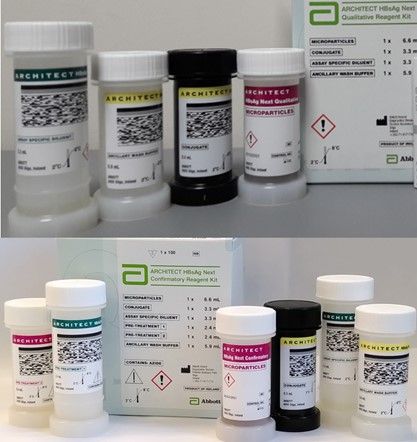Architect HBsAg Next Could Improve Early Hepatitis B Detection
The assay, developed by Abbott Laboratories, is used to detect the hepatitis B surface antigen.
Architect HBsAg

The hepatitis B virus, while in its early, acute phase, directs a protein into the blood called hepatitis B surface antigen (HBsAg). The sooner this antigen can be detected, the sooner that treatment decisions can be made. If HBsAg isn’t cleared within six months post-infection, then the disease is considered to be in a chronic HBsAg carrier state.
Up until now, HBsAg hasn’t always been detected in the early stages in either serum or liver DNA.
Recently, the FDA approved a new assay to detect this protein. Developed by Abbott Laboratories, the qualitative reagent kit, called Architect HBsAg Next, includes the confirmatory reagent kit, the qualitative calibrators, the qualitative controls, and the confirmatory manual diluent. Approved for use in those 2 years to 21 years old, the kit can also be used to test pregnant women, who, if infected, can pass the infection on to their offspring during birth.
Detection of HBsAg occurs via chemiluminescence–a technology that indicates, via electromagnetic radiation, that a chemical reaction has occurred. The prototype of this Abbott assay is reported to be two-to-18 times more sensitive than other assays on the market. Its lower limit of detection is 0.0052 IU/mL.
In a study of 1,138 patients/subjects–1,038 patients whose HBsAg presence was undetectable by conventional assays and 100 HBsAg-negative subjects–the Next assay detected HBsAg in nine seroconversion panels, including seven of the 100 who had been deemed HBsAg negative. Compared with conventional HBsAg assays, Next demonstrated an increment of 5% to 7% detection rate in patients with existing occult hepatitis B.
HepB, despite the availability of a vaccine, continues to spread here and globally.
Last year, immunization advisers to the CDC issued a universal vaccine recommendation covering infants to adults under age 60, including all pregnant women. Until then, the recommendation to inoculate was just for those most at risk–dialysis patients, healthcare workers. And while numbers of those infected have dropped since the first vaccine came on the market in the early 1980s, for certain age groups (like those over 50) the numbers (pre pandemic) of those infected significantly increased.
References
Suk-Fong Lok A. Hepatitis B Treatment: What We Know Now and What Remains to Be Researched. Hepatol Commun. 2018 Nov 15;3(1):8-19. doi: 10.1002/hep4.1281. PMID: 30619990; PMCID: PMC6312657.
Perinatal Transmission of Hepatitis B virus. CDC.https://www.cdc.gov/hepatitis/hbv/perinatalxmtn.htm
Hepatitis B–FAQS, Statistics, Data, & Guidelines. CDC. https://www.cdc.gov/hepatitis/hbv/index.htm#:~:text=Hepatitis%20B%20is%20spread%20when,or%20during%20pregnancy%20or%20delivery
Architect HbsAg Reagent Kit by Abbot. SelectScience 24. https://www.selectscience.net/products/architect-hbsag-reagent-kit/?prodID=173058#tab-2
(May, 2022). A Look at Each Vaccine: Hepatitis B Vaccine. Children’s Hospital of Philadelphia. https://www.chop.edu/centers-programs/vaccine-education-center/vaccine-details/vaccine-hepatitis-b-vaccine#:~:text=Starting%20in%201991%2C%20all%20infants,States%20has%20started%20to%20decline
(April, 2022). Universal Hepatitis B Vaccination in Adults Aged 19–59 Years: Updated Recommendations of the Advisory Committee on Immunization Practices — United States, 2022. CDC. https://www.cdc.gov/mmwr/volumes/71/wr/mm7113a1.htm?s_cid=mm7113a1_w#suggestedcitation
Wong DK, Chen C, Mak LY, Fung J, Seto WK, Yuen MF. Detection of the Hepatitis B Surface Antigen in Patients with Occult Hepatitis B by Use of an Assay with Enhanced Sensitivity. J Clin Microbiol. 2022 Feb 16;60(2):e0220421.